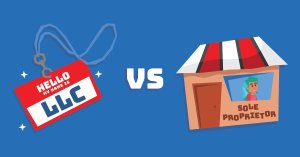Can a Felon Start an LLC?
After spending time incarcerated, people with felony convictions face a tough transition from prison to regular employment. Because of the difficulties in re-entering the workforce, some formerly incarcerated people look to start their own businesses. The good news is that in most cases, there are no laws that prevent felons from starting an LLC. Here, we’ll examine how felons can form a business, the limitations they face, and why an LLC may be their best option.
Limitations on LLC Ownership for Felons
Having a felony conviction does not disqualify a person from owning a business. Ever heard of Martha Stewart? In fact, research shows that close to 4% of small business owners have a criminal record, and that about 1.5% have a felony conviction. This means that more than a million businesses in the US are owned by formerly incarcerated felons.
However, that doesn’t mean that starting a business when you have a felony conviction in your past is an easy road. There are a few hurdles you’ll need to navigate.
Licensing
Felons sometimes face difficulty getting specific business licenses. Whether or not you’ll be able to get a business license depends on the industry in which you’d like to work and the type of crime for which you were convicted. For example, you’ll have a tough time getting a pharmacy license or working in health care if your felony conviction involved illegal drugs. Similarly, people convicted of violent crimes won’t be able to work in childcare or eldercare facilities. On the other hand, there are plenty of small business ideas that don’t exclude people with felony convictions—with a little research, you should be able to find out whether or not you’re eligible to start a business in a certain sector.
Business Loans
A criminal history can act as a roadblock to getting a loan for your business, but it does not necessarily disqualify you. Folks with felony convictions can apply for loans in the same way any other business owner would, but your record may cause issues. For example, lenders like to see a consistent work history, and someone who has spent significant time in prison will need to explain the sizable gap in their resume. Most banks require people to disclose criminal convictions. For example, the Small Business Association requires small business loan applicants to submit a Statement of Personal History. While a felony conviction doesn’t automatically disqualify you, it may serve as a hurdle.
Because of this, many people with felony convictions decide to start LLCs. LLCs can have multiple owners (members), and a member without a criminal record may have an easier time securing funding for your business.
For more on how to fund your new business, check our page on Funding Options For Your Startup.
Grants
Felons can apply for state or federal grants.Grants are different from loans in that they don’t have to be repaid. The one caveat is that there is an extensive application process. Grants.gov, which acts a clearinghouse for federal grants, is probably the first place you’ll want to look. They can help you with understanding grant writing, how to fill out applications, and most anything else a first time grant applicant may need. Another federal program is the US Department of Labor’s Reentry Employment Opportunities (REO) program, which aims to connect those former criminals with federal grant opportunities.
What is an LLC?
Popular with small business owners, an LLC is a type of business structure that combines the benefits of a corporation with the flexible management structure and taxation options of a sole proprietorship or partnership. LLCs offer their owners (members) liability protection, simplified paperwork, and “pass-through” taxation (unless the members elect to be treated as an S-Corp of C-Corp). Starting an LLC is as simple as filing paperwork with your state and paying a registration fee.
Why form an LLC as a Felon?
In most cases there is nothing stopping someone with a felony conviction from starting a business. Starting a sole proprietorship is as easy as selling something—once you do, you’re automatically in business as a sole proprietor. But is being a sole proprietor really the best option for a felon? Probably not. If you plan to grow the business or you’d like to leave the past in the past, LLCs are where it’s at. Here’s why:
- Limited Liability. While going into business as a sole proprietor is easy, doing so doesn’t offer you any liability protection. An LLC, on the other hand, is a separate legal entity from you—the owner. An LLC offers asset protection, which means that if your business is sued, your personal assets are not at risk.
- Credibility. For someone with a criminal record, credibility is important. Sole proprietorship requires no paperwork, but doesn’t offer the legitimacy of an LLC. Taking the steps to form an LLC signals to customers and potential investors that your business is organized and aboveboard legally.
- Privacy. If you have a felony conviction, you already know how a criminal record can follow you around. As a business owner, this can be a problem—potential customers and clients may find information about you online and decide not to patronize your business. If you want to live privately with an LLC, you can hire a registered agent service that will use their name and address on all state filings. This will help keep your name off public record as much as possible, and allow your business to stand on its own merits.
- Funding. Most felons don’t have Martha Stewart’s deep pockets, which means you might need investors or partners to help sustain or grow your business. Felons are generally subject to background checks when applying for financing. This could make it hard for you to secure funding for your business. An LLC allows for multiple members to join together, pool their resources, and build a business together.






